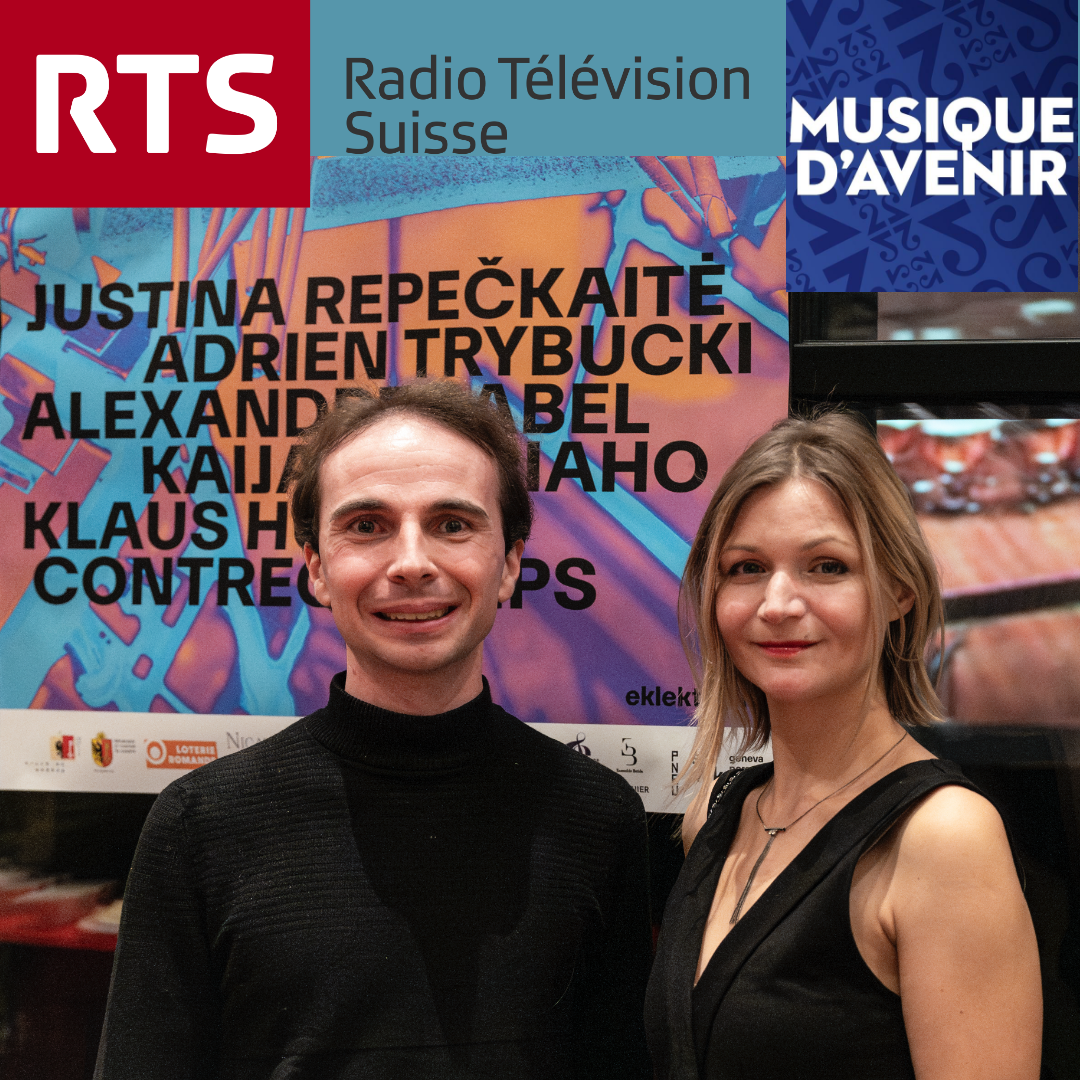
The radioshow Musique d’Avenir on RTS
Listen to the podcast of the radioshow Musique d’Avenir on RTS (The Radio Télévision Suisse) that broadcasted the Eklekto’s "Concert Création" on November 17th at 22:00. Recorded at Les 6 Toits in Geneva on October 11, 2024, the concert premieres Justina Repečkaitė’s composition “Whispering Skin” alongside music by Adrien Trybucki as part of a weekend dedicated to celebrating Eklekto's 50th anniversary.
The host of Musique d’Avenir, Anne Gillot, interviews Justina Repečkaitė, Adrien Trybucki, and Corentin Marillier, one of the co-directors of the Eklekto.

Reviews on Sfäärit (2025)
Reviews of Sfäärit for harpsichord, portative organ, and transducers, premiered at Pannuhalli, Helsinki, on February 6–8, 2025, in three languages:
Tove Djupsjöbacka – “Lågmäld lek med dans och instrument tjusar” (Hufvudstadsbladet, in Swedish)
Auli Särkiö – “Kuukauden kynä: Sfäärit” (Zodiak.fi, in Finnish)
Simon Cummings – “Musica Nova 2025” (5against4 blog, in English)
In Sfäärit [spheres] for harpsichord, organ, and electronics, receiving its first performance, Repečkaitė set up a compelling soundworld balanced between free-wheeling and the sense of something being worked through. Light harpsichord notes and chords were sporadically echoed and accompanied by the organ, in an effective relationship that grew more insistent over time. The three dancers, by contrast, went the other way, ending up collapsed, resting and (i kid you not) smoking.
5against4 © Simon Cummings Musica Nova 2025 (Part 1) February 26, 2025

Reviews from Baltic and Estonian Music Days in 3 languages
Pierre Rigaudière from Diapason in La musique balte sous les projecteurs européens à Tartu writes about Tarmo Johannes performing my composition Incantare:
"Dans ce contexte, la flûte basse quelque peu chamanique mais remarquablement précise d’un Tarmo Johannes arbore dans Incantare (2018) de Justina Repečkaité un visage inattendu – l’interprète est invité à chanter dans un instrument augmenté par une électronique très vocale."
Lawrence Dunn from bachtrack writes about Estonian National Symphony Orchestra, led by British conductor Clement Power concert in a review Oceanic swells, orchestral tangles: Baltic & Estonian Music Days:
"Justina Repečkaitė’s Vellum was the most successful work on the programme. The music seemed confident and direct, something that can be difficult for many composers for whom orchestral pieces are relative rarities. The music felt straightforwardly au courant too. Constructed like other pieces in the programme from waves of dissonant harmonic pile-up, at the piece’s centre was a repeated, unrelenting section built around upward glissandos in horns and strings, sharp violent crescendi and noisy percussion. This section drives itself home, before a short, sinister conclusion, which ends almost as soon as it arrives. Arresting and contemporary."
5against4 blog blog pots Baltic & Estonian Music Days 2024 (Part 3) of Simon Cummings:
“Taking first prize for the most startling venue used at this year’s festival was Tartu University’s Museum of Natural History, where the members of Ensemble U: performed – and we all stood – in the midst of a vast menagerie of live and preserved animals. The three pieces that made the strongest impression did this by (unintentionally) playing into the connotations of the natural world surrounding us on all sides. Justina Repečkaitė‘s Incantare, being premi5against4 blogèred in a new version devised by flautist Tarmo Johannes for bass flute and electronics, spoke like a primordial voice, expanding into a carefully executed ritualistic act, the precision of which (Johannes is an astonishingly precise performer) was periodically broken up by wildness. At times, the live and electronic sounds sounded as twin strands of this same act, with the electronics often coming across like a more literal vocal mouthpiece to the more abstract and stylised material emanating from the flute. “
Deutchlandfunk podcast in Selbstbewusste Musikkultur – die Baltic and Estonian Music Days in Tartu features an excerpt of Incantare (2018) performed by Tarmo Johannes while presenting the Ensembel U: concert at the Natural Hisytroy Museum of Tartu.

Reviews of La muë (2024)
After Repečkaitė’s premiere of La muë (2024) for seprent, children’s choir and electronics at Ircam, reviews:
L’effet « Janus » à l’Espace de projection de l’Ircam by Michele Tosi on ResMusica
and Janus 2024 : le miroir à deux faces de la musique d’aujourd’hui by Frédéric Norac on musicologie.org.

Playlist #12 on Janus, Centre de Musique Baroque de Versailles
Playlist on Janus #12, by Justina Repečkaitė, for the second anniversary of the Janus project, the fruit of an innovative partnership between the Centre de musique baroque de Versailles and Ircam: “With this brief panorama of my favourite music, putting contemporary and early music in dialogue, I'd like to present a few examples illustrating how the inspirations of today's creators are not limited to musical influences from the past, but also explore the subjects of legends, artefacts or philosophical concepts from distant times.“
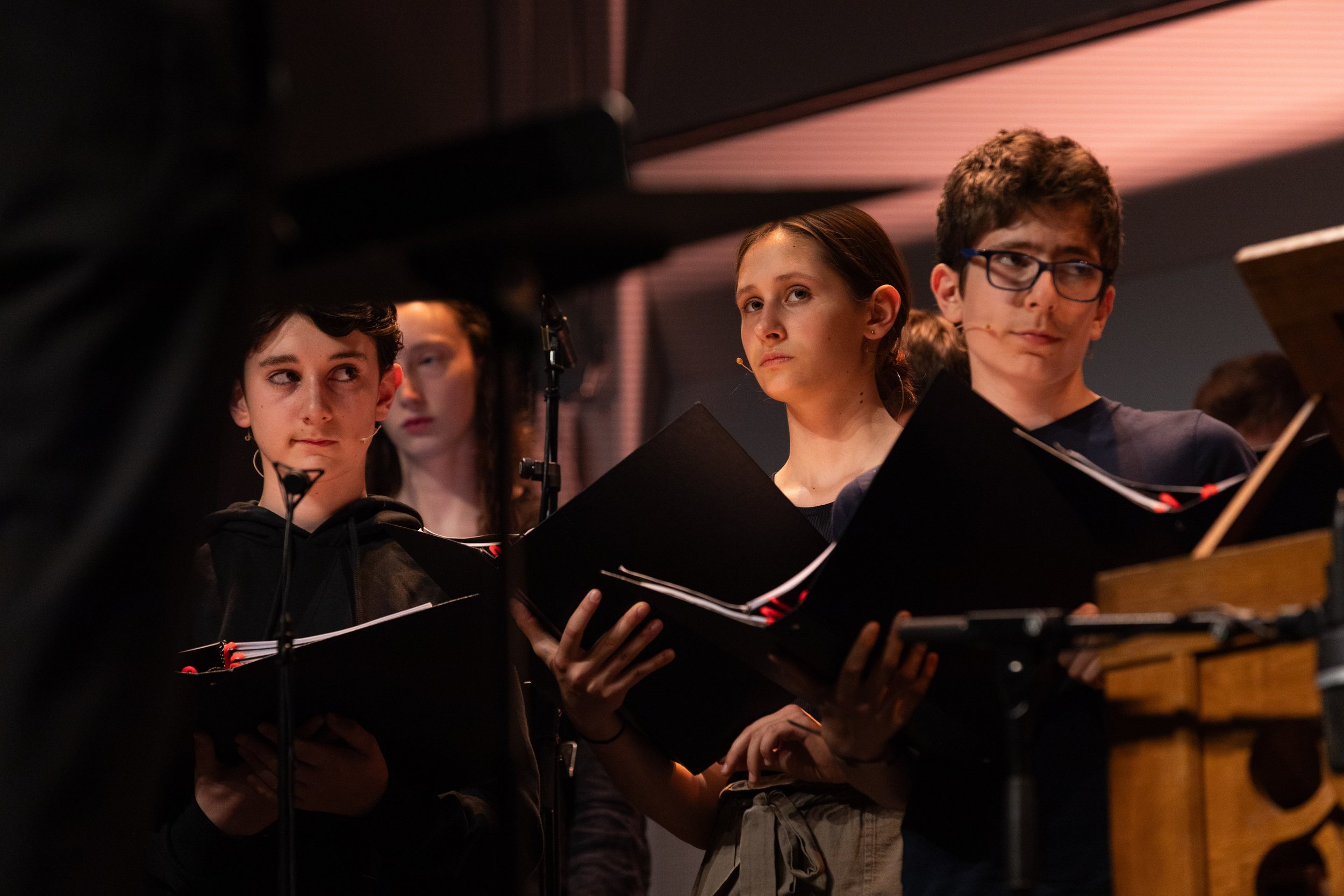
Interview for Janus project
In light of the upcoming concert "Janus" on the 27th of April at IRCAM, read an interview (in French or English!) with Jug K. Marković and Justina Repečkaitė conducted by Jérémie Szpirglas on the Ircams’ website.
The Moulting of Music - Janus 2024
What previous knowledge or practice did you have of Early music and most especially of French Baroque music? Did this potential practice influence your approach to composition?

Podcast Forumopera
Listen to the podcast Le Bel aujourd’hui: Justina Repečkaitė at Forumopera where Alexandre Jamar interviews Justina about her upcoming premiere of La muë for serpent, children’s choir and electronics to be performed by Patrick Wibart and Les Pages (cond. Clément Buonomo) of the Center of Baroque Music Versailles - CMBV at IRCAM ont he 27th of April, 2024. They also discuss subjects like composing, early music, vocal music, electronics and more.
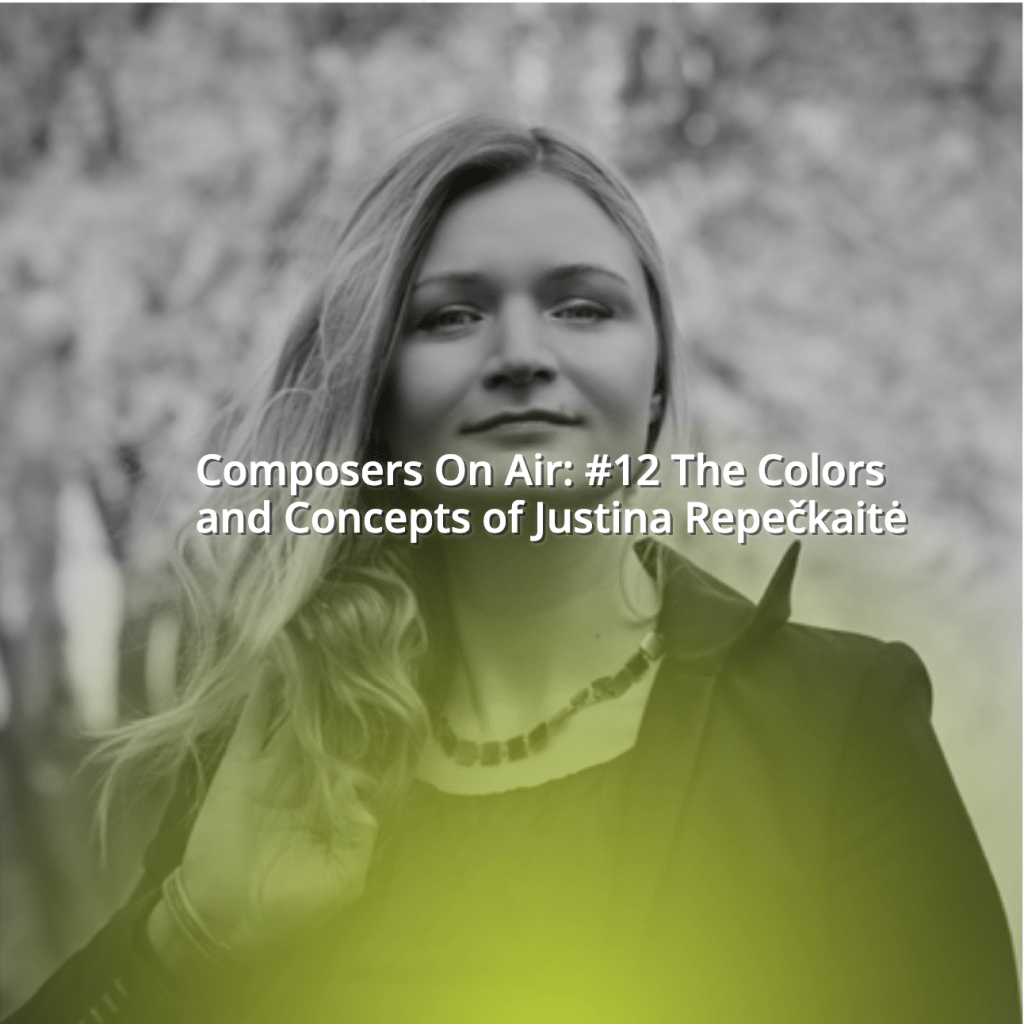
Podcast The Colors and Concepts of Justina Repečkaitė
“With the innovative courage of Modernism combined with a deeply focused ruthlessness of fine detail, Repečkaitė guides us through a musical journey ranging from her cultural roots of folk music, her musical beginnings, then sharing the most complex experiments and meticulous execution in electronic and computer-based music. Electro-acoustic projects with groundbreaking techniques and meaningful collaborations with instrumentalists are a highlight as she walks us through her experiences at IRCAM (Institut de recherche et coordination acoustique/musique) in Paris.”

Microtonality in works for solo piano: Three case studies in the Baltic keyboard repertoire
Recently, at Jāzeps Vītols Latvian Academy of Music, an American pianist Robert Fleitz defended his Master thesis “Microtonality in works for solo piano: Three case studies in the Baltic keyboard repertoire”. Fleitz discusses 3 compositions for piano written by Baltic composers: Santa Ratniece (1977) – In Love with Liberty (2016), Liisa Hirsch (1984) – Quantum Well (2020) and Justina Repečkaitė (1989) - Sturnus vulgaris cohibitus (2020).
Justina’s music was also analyzed by Lithuanian Academy of Music and Theatre students: Ona Jarmalavičiūtė’s bachelor thesis Komponavimo proceso atodangos J. Repečkaitės kompozicijoje „Chartres” (2018) examines her piece Chartres (2012) for string orchestra and Agnė Pilkauskaitės’ Master thesis The significance and expression of extended techniques in sonorous compositions for string instruments (2021) includes an example of Vellum (2020) for orchestra.

TEMPO Darmstädter Ferienkurse 2021 on Pulsating Skin
In an article Darmstädter Ferienkurse 2021 from the journal TEMPO (Cambridge University Press) musicologist Max Erwin writes:
“Right next door in front of the steps leading up to the Ludwigskirche, Justina Repečkaitė’s Pulsating skin began as four snare drum membranes began to vibrate from the effect of transducers placed on their underside, just as the title promised…
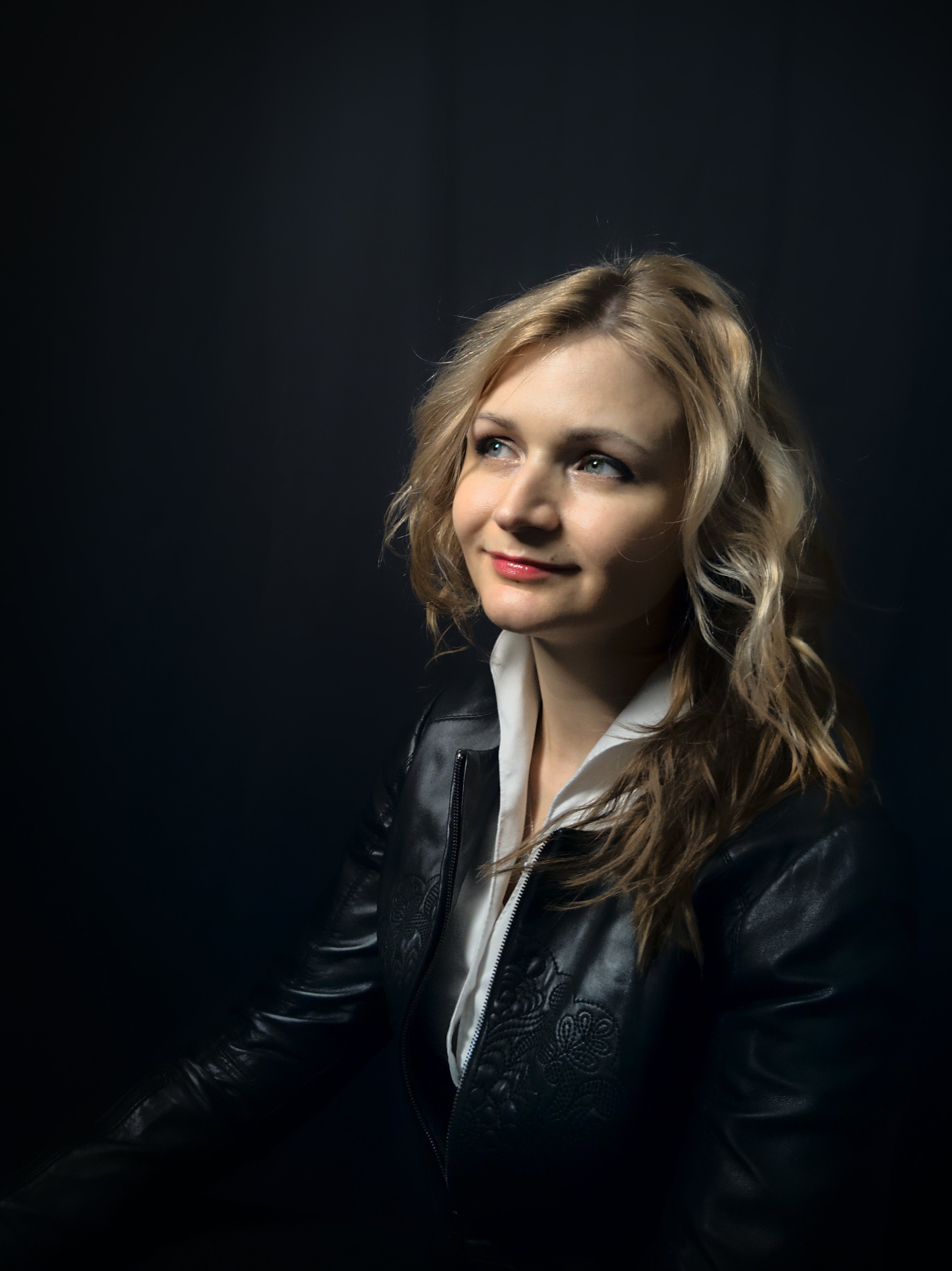
Press and podcasts in Lithuanian
Šarūnas Nakas, composer and cultural critic, prepared a radio essay Alchemy. Justina Repečkaitė (2020) for Lithuanian National Radio :“It seems like Repečkaitė is some kind of a situational alchemist: her compositions are like life cycles of sonic figures, also, sounds themselves are very materialistic. Processes are quite plant-like, truly organic: withering, germinating, unfolding, wilting, bursting into bloom, blossoming.“

Lithuanian modernisms: Alternative paradigms in contemporary Baltic art music
In her PhD thesis Lithuanian modernisms: Alternative paradigms in contemporary Baltic art music at University of York, Claire McGinn (2021) discusses “the modernist-leaning heterogeneities of Lithuanian contemporary art music, and the roots and consequences of a narrow aesthetic and conceptual template common to dominant paradigms of Baltic art music“.

Reviews in French
Reviews in French on Justina’s music from Télérama, Journal Zibeline, Resmusica and Anaclase.

Rūta Staneviciūtė on microtonal music
Microtonal music is probably the most striking utopia of Lithuanian music that emerged in between two worlds wars. For a long time it seemed that we had J.Kačinskas and 50 years in, – R.Mažulis. But when my colleges and I started to get interested in the topic we have found phenomena…
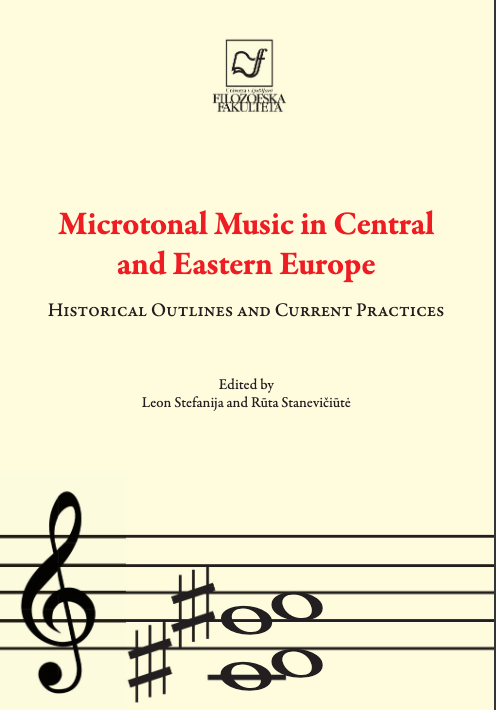
Microtonal Music in Central and Eastern Europe
Exemples of Justina’s systematic quarter-tone approach to composition featuring pre-compositional charts and score reductions of her compositions Tapisserie, Acupuncture and Pulsus Flatus Vox appear in Rima Povilioniene‘s article From Tone Inflection to Microdimensional Glissando: Observations on Microtonal Manner in Contemporary Lithuanian Music
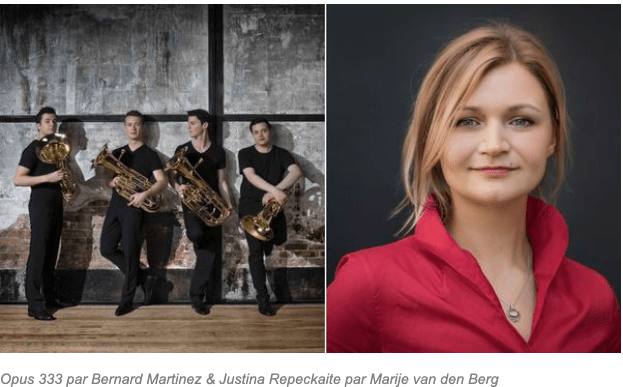
Encierro on Radio France
Listen to Justina’s music on Radio France podcasts: composers portrait and Encierro in parts 1, 2, 3, 4, 5.
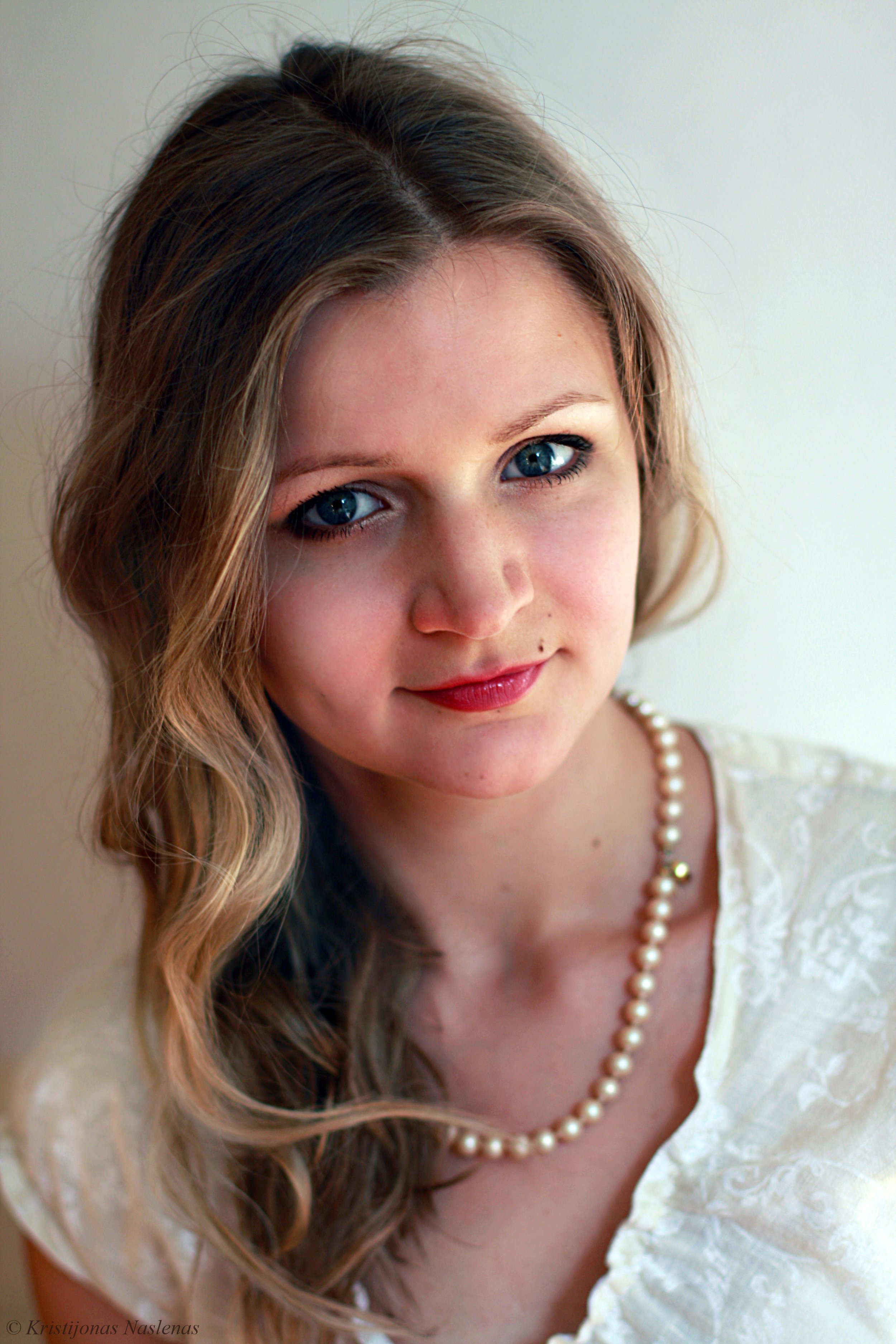
Justina Rapeckaite’s profile by Ben Lunn
The music of Justina Repečkaitė has many similarities to a diamond. With its hard unforgiving shape and geometric perfection, it creates a profound and striking beauty, which singles her out from many composers of her generation.

Chartres review by Ben Davis on Sight Listen blog
Slowly unfolding and stunningly textured, Lithuanian-born, Paris-based composer Justina Repečkaitė’s for chamber orchestra is a thoroughly riveting listen.
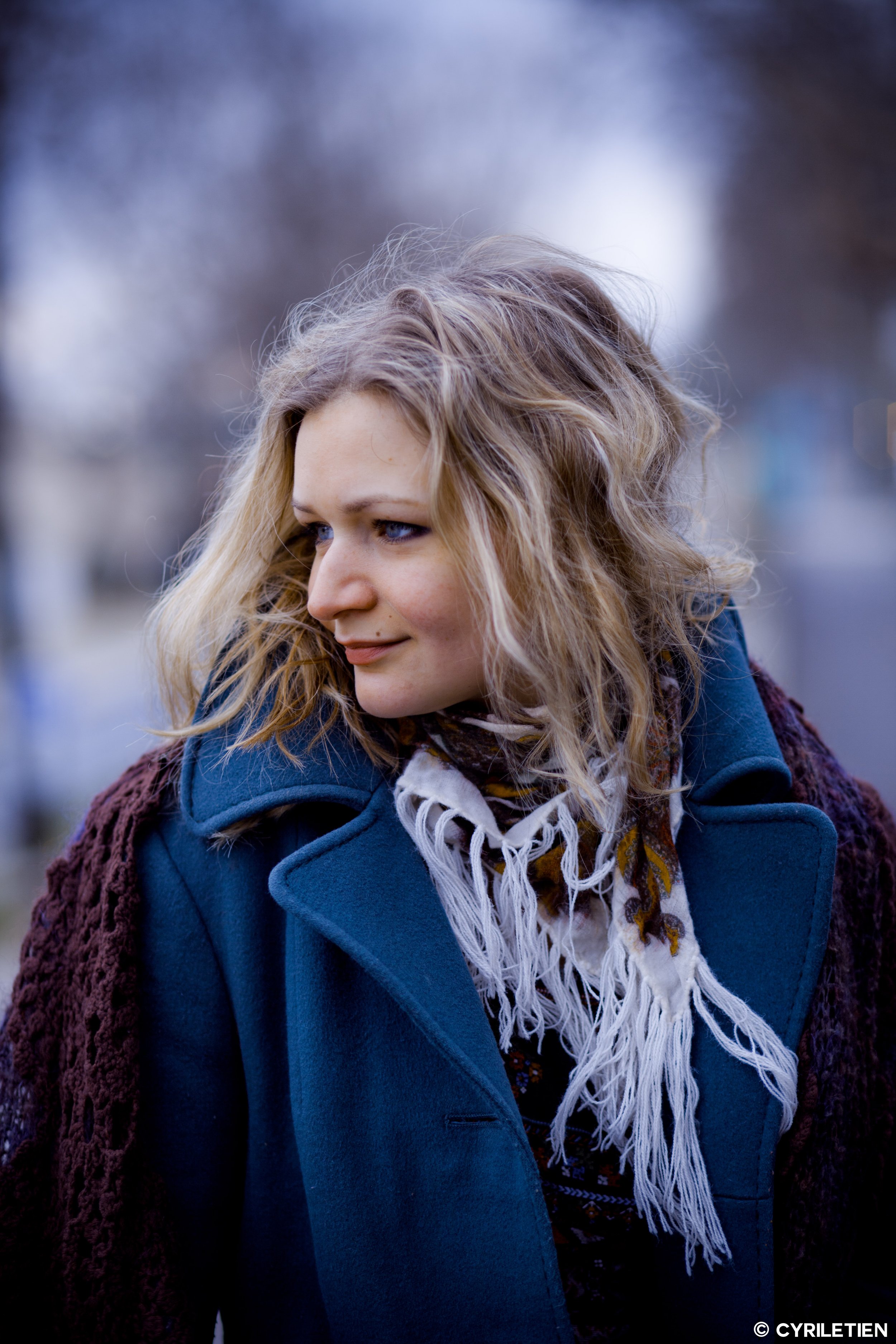
Interview with Justina Repeckaite: “I had a sincere confidence in my piece”
On the 29th September, during the ceremony held by Lithuanian Composers’ Union, prizes were awarded for most prominent pieces of the year and musicology competition works. Every year the most intriguing nomination is the Début of the Year, this year the prize was awarded to young a composer Justina Repečkaitė for a string orchestra piece “Chartres”.